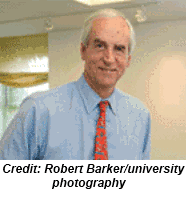|
|
|
|
|
|
|
News & Views item - March 2012 |
![]() Association of American Universities' New President "On Teaching, Tuition, and
Talent".
(March 16, 2012)
Association of American Universities' New President "On Teaching, Tuition, and
Talent".
(March 16, 2012)
 Today's
issue of Science features a Q&A session with Hunter Rawlings III, the
newly installed president of the
Association
of American Universities (AAU), the 61 top research universities in
North America. Professor Rawlings, is a professor of classics who has served a
president of the University of Iowa and Cornell University.
Today's
issue of Science features a Q&A session with Hunter Rawlings III, the
newly installed president of the
Association
of American Universities (AAU), the 61 top research universities in
North America. Professor Rawlings, is a professor of classics who has served a
president of the University of Iowa and Cornell University.
Some excerpts:
Professor Rawlings opened with: We have not been doing a great job of teaching science and engineering, especially to freshmen and sophomores, so over a 5-year period, we are going to try and make a difference by disseminating to our members the results of the latest research on teaching and, frankly, advocating for them.
Science: The National Institutes of Health is concerned about the aging of its grantees. Is AAU doing anything to address the issue of older faculty members who don't want to retire?
Professor Rawlings: I think it's irresponsible when faculty members stay on in their positions because the law allows them to. At a time when jobs are scarce, I think it's your responsibility to retire and allow the next generation to step forward into academic positions. Some departments do a great job of creating the expectation that you're going to retire at age, say, 67, or whatever it happens to be. And the peers make that work. They make it impossible for someone to stay past that point because it's regarded as inappropriate.
Science: There's talk that cuts in state support are turning flagship state universities into quasi-private institutions. What's your view?
Professor Rawlings: Well, they aren't going private. They're
owned by their states. They'll always be owned by their states. So I think it's
bad talk to suggest otherwise.
But it's certainly true that the share of their budgets
coming from their states is getting smaller. And that's a shame, because it
leads to the perception that education is no longer a public good, which was the
understanding we've always had. It's become a private interest, and an economic
one at that. And that's not so great. But right now state budgets are also
stressed because of the bad economy and the need to spend more on prisons, on
K12 education, on Medicaid, and so on.
Fortunately, research universities are remarkably resilient. They have other ways of raising funds. Prisons don't have a whole lot of donors interested in naming cells. But universities have been very successful in raising money, as well as winning grants for research and having industry to invest. So they are doing their best to cope.
Science: Many universities tout their ability to help stimulate their region's economy. What do junior faculty members need to know about technology transfer, and is there a risk that schools will over promise?
Professor Rawlings: Not to be flippant, but I think it's absolutely fine for a young professor in my field, Greek and Latin, to know absolutely nothing [about commercialising their research]. After all, this is only a portion of what goes on at a research university. But seriously, I think a young researcher in a STEM field has a responsibility, if her work has some possible applications, to be open to someone from the university coming to her and saying, We think your work has some economic potential. And we'll help you with that.